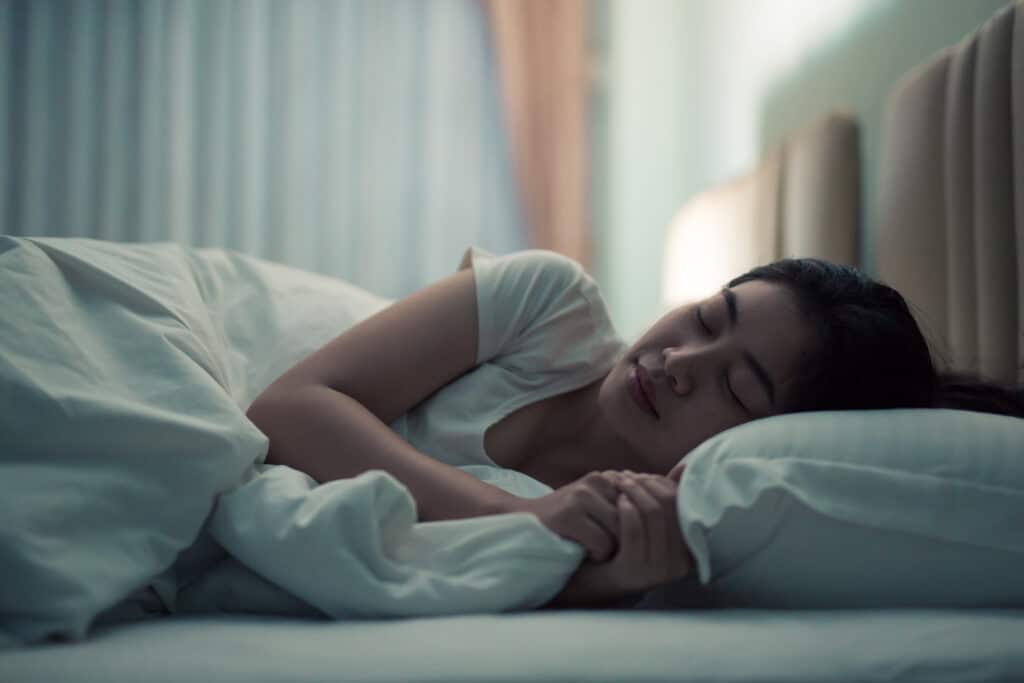Snoring affects millions of men and women worldwide. Although it can be annoying to the person sleeping next to you, snoring and sleep apnea can have serious negative health effects such as poor sleep, fatigue, and increased risk for diabetes, stroke, and heart attack. That’s why at the Washington Center for Dentistry, our experienced team of doctors offers personalized snoring consultations to evaluate your risks for snoring and sleep apnea. They can then fit you with a custom snoring appliance or prescribe a CPAP machine for sleep apnea. If you’re in the Washington, DC area and are experiencing problems with snoring, call us today to schedule an appointment. Let us help you get the quiet, restful, and healthy sleep you (and your partner) need.
Snoring Appliance
Snoring is pretty common—among men and women! The reality is that nearly one in three adults snore on a regular basis, and men snore more than women. Snoring increases with age and increasing weight. Drinking alcohol before bed, being overweight, smoking, or overeating—all make snoring worse.
For patients with Obstructive Sleep Apnea (OSA), a condition that blocks the airway and momentarily interferes with normal breathing, peaceful sleep can be disrupted. The skilled dentists at Washington Center for Dentistry can prescribe a convenient, comfortable oral snoring appliance that helps reduce snoring and restore restful sleep. The dental device, which resembles a sports mouth guard, is known for better compliance than CPAP systems, which pump air through a nasal mask. Since CPAP isn’t easily tolerable by some patients, a snoring appliance is a much better option for them.

How Do Snoring Appliances Work?
Most of our patients (and their spouses!) are happily relieved to learn that a convenient, comfortable oral appliance offers a state-of-the-art solution that is less invasive and more comfortable than conventional treatments. It is:
- Comfortable, custom fit, easy to wear.
- Worn during sleep.
- Hidden inside the mouth, allowing lips to close.
- Seamless where the mouth can open and close normally.
- Small enough to fit in the palm of your hand.
- Easy to carry when traveling.

Sleep Apnea
When the tissues at the back of the throat relax during sleep, the airway narrows and vibrates, causing snoring. For some people, loud snoring signals a more serious condition, Obstructive Sleep Apnea (OSA), a condition that blocks the airway and momentarily interferes with normal breathing. Fortunately, the brain realizes more oxygen is needed and wakes a person up to breathe. OSA sufferers can experience hundreds of apnea episodes in one night, but they likely do not remember them. In fact, many who live alone, or sleep separately, often are unaware of their condition.
A lack of restful sleep as well as “poking” by an irritated sleeping partner often prompts many people to seek relief. The trained dentists at Washington Center for Dentistry can prescribe a CPAP machine to control the condition. CPAP (Continuous Positive Air Pressure) pumps air through a nasal mask to keep the airway open. While it is an effective treatment, some patients find it difficult to tolerate the CPAP unit while they are sleeping. If this is the case, the dentist can offer other alternatives to relieve sleep apnea/snoring symptoms.
Do I Have Sleep Apnea?
While people with sleep apnea think they are sleeping well, they may be struggling for air. As a result, they never receive the benefits of the nightly relaxing sleep needed for good health. Without the feeling of being refreshed, these men and women often drag through their days. More disturbing is that matters can grow worse since the periodic lack of oxygen can cause high blood pressure, abnormal heart rhythms—even a heart attack or stroke.
Sleep apnea is a potentially deadly condition that may increase a patient’s risk of premature death by 50% and risk of cancer death by up to five times. Proper treatment can virtually eliminate these risks, but in order to receive treatment, a patient first has to know that he or she has a problem, which means being aware of the symptoms of sleep apnea.
To find out if you exhibit sleep apnea symptoms, complete the simple questionnaire:
- Do you snore?
- Is your snoring interrupted by pauses or choking?
- Has anyone ever said that you stop breathing or pause your breathing during sleep?
- Do you feel fatigued, exhausted, or tired?
- Do you have high blood pressure or diabetes?
- Do you wake up at night or in the morning with headaches?
- Have you ever nodded off or fallen asleep while driving?
- Have you ever been diagnosed with sleep apnea?
- Do you have problems keeping your legs still at night or need to move them to feel comfortable?
- Do you usually get less than six hours of sleep each night?
- Do you feel that your sleep is not refreshing or restful?
- Do you have periods of the day when it is hard to pay attention, remember things, or stay awake?
If you answered “yes” to some or most of these questions, you should contact Washington Center for Dentistry to set up a sleep apnea consultation. Join our many patients who benefit from simple treatment.